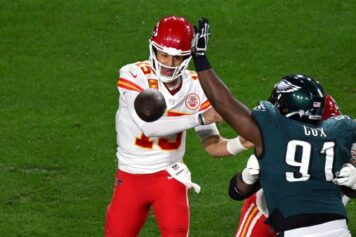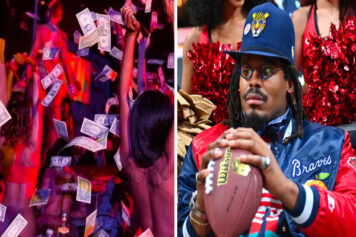Last month, Cam Newton was one of two GQ cover boys – the other was Tim Tebow. The Tebow piece, like so many written about him, was partly an assessment of Tebow’s cultural standing. The title referred to him as a “Sunday Savior” and featured pictures, taken during his Florida Gators days, of him in a pose that conjured Jesus Christ on a cross. You get the feeling that, at some point, we’re going to start referring to the man as a “Christian quarterback.” Meanwhile, in Newton’s 2,500-word profile, there was no mention of being a “black quarterback” – the phrase did not appear. Race didn’t come up, at all.
Around the same time – and about 20 years after shorty Charlie Ward won the Heisman Trophy and then went undrafted in the following NFL Draft – rookie Russell Wilson beat out Matt Flynn for the Seattle Seahawks’ starting quarterback spot. Not only had Seattle invested $20 million in Flynn, but Wilson was – aside from being a Miami Vice-era Phillip Michael Thomas lookalike – a “barely six-foot,” third round draft-pick that spent five years in college. That’s not stud pedigree.
Wilson’s rise came up as a conversation topic in my Harlem barbershop when his mug popped up on ESPN. Some of the patrons were unaware of the kid. A quick recap of his story elicited this response: “Man, that’s some white-boy sh#t.”
Translation: Some short, moderately-touted rookie that wasn’t “Michael Vick” athletic, beating out a more proven quarterback – with significantly more millions of guaranteed franchise-money – is foreign terrain for black quarterbacks.
It was a poignant observation. It was also an indication that we are living in a New Day.
The “black-quarterback” no longer exists.
Russell Wilson, Cam Newton, Robert Griffin III, Michael Vick – they’re all simply quarterbacks. A post-racial America often seems like a sickeningly unattainable dream. Who’d have thought the NFL – an institution that can sometimes lag behind modernity – would be one of its vehicles?
**************************
There was a long held legend (debunked since) that, leading up to Super Bowl XXII, Doug Williams – the first quarterback with brown skin to start under center in Super Bowl – was asked “How long have you been a black quarterback” during the numb-skulled Media Day. Williams’ mythical response was supposedly something like, “I’ve been a quarterback since high school and I’ve been black all my life.” Now that’s an el-oh-el. The fictional exchange highlighted that, back then, black quarterback – due to its rarity and otherness – was, in essence, a wholly different position.
On October 6, 1968, Marlin Briscoe took a snap from the Denver Broncos center and became the first starting quarterback in the NFL that was a black man. He was good, but not great (14 TDs and 13 INTs) and, as you might imagine, black quarterbacks were on short leashes. The Broncos released him and, the next year, he was picked up by the Buffalo Bills, who turned him into a wide receiver. That same season, the Bills made their draftee, James Harris (one of Eddie Robinson’s boys at Grambling), the first black man to start a season at quarterback in professional football. Harris did his thing. He was the first black quarterback to start a conference championship game in 1974. That same year, he was the Pro Bowl MVP. Still, he was always a novelty, a deviant version of the position he played.
In a 1998 ESPN The Magazine piece on the evolution of the quarterback position (one that shadowed Donovan McNabb in the lead up to the Draft and contained a section on “White QBs With Flavor” – among them Cade McNown), Harris explained: "The position I played was black quarterback. I never played quarterback, only black quarterback.”
You feel him? Harris was saying that a “black quarterback” was an actual “thing.” It was its own position, like cornerback or tight end. “Black” was not a modifier. It didn’t matter if you were an “athlete” scat-backing all over the field, like Kordell Stewart, or stationary and chilling in the pocket, like Warren Moon – you played black quarterback.
It was a tough racket. The doubt was incessant. Coming in as a black quarterback performing away the ethnic tag was a constant chore. After five years and two division titles, Doug Williams was only the 43rd-highest-paid quarterback in the league. People were sending him rotten watermelons in the mail, with letters that read “Throw this, nigger. They might be able to catch it.”
Those instances let Williams know he was playing a position that, in the 80s, was different than what Joe Montana and Phil Simms were playing. His position was sociocultural. Others followed, like Randall Cunningham, which made it sociocultural and athletic. It was never pure quarterback. We wouldn’t let it be.
We got to where we are at now, however, via a combination of success and frequency that rendered a brown skin man taking snaps from a center a non-story. Whereas Cunningham and Moon were essentially conspicuous weirdoes during their primes, Tampa Bay’s current quarterback Josh Freeman is virtually invisible – that’s a good thing, by the way.
Along the way, we’ve had landmarks and important nodes. In 1994, Steve McNair, playing for historically black Alcorn State, appeared on the cover of SI, its headline calling for voters to give him the Heisman. New terrain. He was the third pick in the 1995 Draft – the highest ever for a black man playing quarterback. Donovan McNabb bested him years later as the second pick of the 1999 Draft. This was just a few months after McNair started at quarterback in Super Bowl XXXIV, 21 years after Williams. Michael Vick was the No. 1 pick of the 2001 Draft. By 2003, there were seven black men starting at QB, three finished with QB ratings in the top 10 and McNair shared MVP honors with Peyton Manning. The next year, McNabb, Vick and Minnesota's Daunte Culpepper were elected as the three NFC quarterbacks for the Pro Bowl; and Vick and McNabb met in the NFC Championship. In the lead up to the game, Vick said: "It shows how far we've come, how far this league has come. So, this game does mean a lot to me. Like Donovan said, it's a big step for all of us."
**************************
We’re always looking for signs that America has finally arrived at the mythical “post-racial” state, where race no longer matters. Of course, we aren’t there, yet. Race continues to be, at least, a subtext in so many areas of our everyday lives and it would be foolish to think that the imperfect human beings running NFL franchises and making personnel and coaching decisions don’t knowingly or unknowingly function based on prejudices. If you look hard enough, you might (might) find latent racial prejudices in Donovan McNabb’s unemployment or some of the recent Cam Newton-backlash. But, hyper black protectionism and tribalism – born from generations’ worth of warranted “us against them”/“you go boy” banding together – is no longer necessary. My pops – because he’s pops – will still root for Russell Wilson to succeed and not care, at all, if fellow-rookie Ryan Tannehill flames out. He might feel duty-bound. But, have you watched college football, lately? E.J. Manuel and Geno Smith don’t need Freeman or RG3 to be Warren Moon or McNabb to keep membership to the pro-quarterback club open for black men.
We’ve arrived at what looks to be a meritocracy. If you can ball, you can ball. Antiquated ideas about black men’s lack of intelligence or ability to lead seem to have shrunk to the size of a non-issue. Wilson’s story is an indication. It’s not a civil rights victory per se, but it is a victory for all of the people and players that showed-n-proved to debunk all of the myths associated with black quarterback cognitive skills.
In September, Tiki Barber, wrote this in the USA Today:
“In the coming years, more and more "athletes" will command the position. The reason is simple: At the college, high school and even Pop Warner levels, teams are increasingly utilizing spread offenses — which are faster-paced and develop the read-and-react skills needed in the fast-paced NFL game…Additionally, the "athletic" quarterback, in essence, gives an offense a sixth skill position player — someone who is not frail nor opposed to contact and running in the open field. Offensive vs. defensive game-planning is a constant chess match, and it will be fascinating to watch as the most important offensive position continues to evolve.”
Tiki’s not getting it, either. He seems to be saying that, that black men are playing a position other than quarterback, a position the game is still evolving toward or changing to. His idea (innocent, I’m sure) ignores progress. RG3 doesn’t need the game the quarterback position to change to do his thing – he’s doing it now.
**************************
The Buffalo Bills released Vince Young in late August. There was no uproar, just head-shaking. Only an archaic or hyper-sensitive soul would have went to the “it’s because he’s black” rhetoric. But what was really telling, an exhibition of the black quarterback extinction, is that the Bills brought in Tarvaris Jackson. Jackson has now been milling around the league for seven years, playing median-level QB, for the most part – if that. White quarterbacks used to have a monopoly on spinning mediocrity into tenured careers.
It reminded me of a Chris Rock bit from “Kill The Messenger.” Dig his observation:
"I live in a place called Alpine, New Jersey. My house costs millions of dollars. In my neighborhood, there are four black people. Hundreds of houses, four black people. Who are these black people? It's me, Mary J. Blige, Jay-Z and Eddie Murphy. Only four black people in the whooooole neighborhood …Do you know what the white man that lives next door to me does for a living? He's a f&%$!#@ dentist! He's not the best dentist in the world! He's not going to the dentists' Hall Of Fame! … Black man gotta fly to get what a white man can walk to. … I had to host the Oscars to get that house and to this day… Do you know what a black dentist would have to do to move into my neighborhood? He'd have to invent teeth!"
But here we are, 2012 in the NFL and Jackson has a gig. Chris might call him a dentist. Nobody should call him a black quarterback. There’s no such thing.



